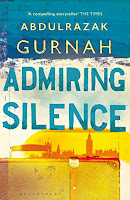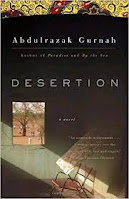To my great embarrassment, I was not aware of this writer and so I have embarked on an exploration to learn more about him and his work.
Born in Zanzibar in 1948, Abdulrazak Gurnah fled at the age of 18 to escape persecution of Arab citizens during the Zanzibar Revolution. He arrived in the UK in the 1960s as a refugee, where he resides today. He earned a PhD from the University of Kent and was an English professor there until his retirement.
He is the author of short stories, essays and ten novels. He has been in the running for the Booker prize twice. Gurnah is the first black author to receive the Nobel Prize for Literature since Toni Morrison was recognised in 1993. East Africa is the setting for much of Gurnah's fiction with his characters often experiencing the alienation and loneliness of migration, the sense of being between two worlds.
Let's take a look at his novels.
Memory of Departure (1987) - Gurnah's debut novel is set in a post colonial East African county. Narrator Hassan is a teenage boy, raised in poverty. He family life is marred by violence and squalor. His mother sends him off to Nairobi to stay with her brother. His uncle is a wealthy businessman, and Hassan is exposed to a lifestyle he has never experienced. As Hassan's horizons are broadened and he can see alternative futures for himself, he learns that his uncle's success is built on corruption. The novel addresses themes of poverty, oppression and post-colonial identity.Pilgrims Way (1988) - Daud is an emigrant from Tanzania to England in the 1970s. He works as a hospital orderly, writes letters and enjoys cricket. He cannot go home as he would be persecuted as a Muslim, but struggles to make a new home where he is unwanted and experiences racism daily. Daud is saved from bitterness by his sense of humour, as he reconciles his past and tries to come to terms with his pilgrimage.
Dottie (1990) - The story of a young woman discovering her family and cultural history. Dottie is seventeen when she takes responsibility for her brother and sister - desperate to keep her family together. Unlike Gurnah's previous novels, the protagonist Dottie is born in Britain. But Dottie realises that England does not embrace women of colour and endeavours to explore her family's past and learn more about her African heritage.
Paradise (1994) - Shortlisted for the Booker Prize, this historical novel follows Yusef, a twelve year old boy who has been given to a merchant as an indentured servant to pay off his father's debt. Set in East Africa before World War I, Yusef joins the merchant's caravan as they journey to the interior of Africa and the Congo Basin. Here they experience the wildness of nature, animals and the hostility of locals. Paradise is about the change coming to Africa, bringing about freedoms and loss.
Admiring Silence (1996) - In this novel a man emigrates from Zanzibar to England. Here he meets and falls in love with an English woman and tells her stories of his past. He becomes a teacher in a London school. When it is eventually safe for him to return to his homeland, he journeys back to see what has happened to the family he left behind. He finds that it is not as he remembered and is able to see his current life with new perspective.
By the Sea (2001) - Longlisted for the Booker Prize, this novel is a story of migration and the plight of refugees. Saleh Omar attempts to enter the UK on a fake passport, using a stolen identity. The son of the person whose identity was stolen also attempts to get to the UK but via a different route. Their interwoven stories come together to paint a picture of life in exile and the experiences of racism and imperialism.
Desertion (2005) - This novel begins in 1899 when a British adventurer, Martin Pearce, stumbles into an East African village having been abandoned by his guides. A local shopkeeper takes him in and he is nursed by the shopkeeper's beautiful sister, Rehana. Despite the clash of cultures, romance blooms. Their story is told decades later by Rashid, an academic teaching in England. Their forbidden love is mirrored in the affair Rashid's brother is engaged in with Rehana's granddaughter. Desertion brings to life the personal and political consequences of colonialism.
The Last Gift (2011) - Abbas is an East African immigrant living in England. He has a stroke and begins to reflect on his past. Abbas has never spoken about his past before - his life as a sailor, the time before he met his wife and had children. Now, his stroke has left him unable to tell these stories, but he still seeks to share his secrets with his wife and adult children. This is a story of identity, displacement and the intergenerational impact of migration.
Gravel Heart (2017) - A young child in Zanzibar when his family breaks up, Salim does not understand what has happened. He lives with his mother and uncle and has an estranged relationship with his father. Salim turns inwards and concentrates on his school work where his success paves the way to England to take up business studies. He arrives in London bearing the weight of his family's expectations. He befriends other immigrant students and then needs to decide whether or not to return home.
 Afterlives (2020) - From the 1880s until World War I, East Africa was colonised by Germany. This historical novel follows the lives of three locals in the early 20th century. Ilyas and Hamza become part of the German colonial infantry. When these friends return home from war they find that Ilyas' parents have gone and his sister Afiya has been given away. Afterlives is a story of love, friendship and kinship, against the backdrop or a larger consideration of the generational impacts of war and colonialism.
Afterlives (2020) - From the 1880s until World War I, East Africa was colonised by Germany. This historical novel follows the lives of three locals in the early 20th century. Ilyas and Hamza become part of the German colonial infantry. When these friends return home from war they find that Ilyas' parents have gone and his sister Afiya has been given away. Afterlives is a story of love, friendship and kinship, against the backdrop or a larger consideration of the generational impacts of war and colonialism.









